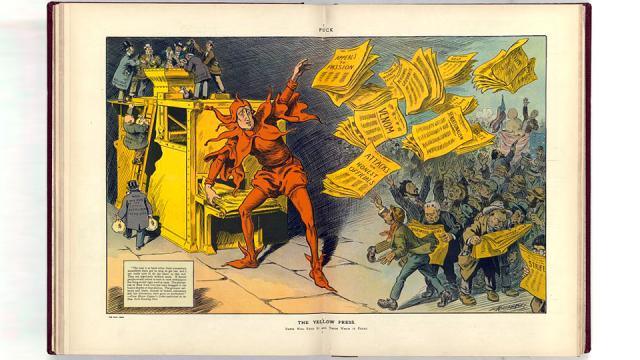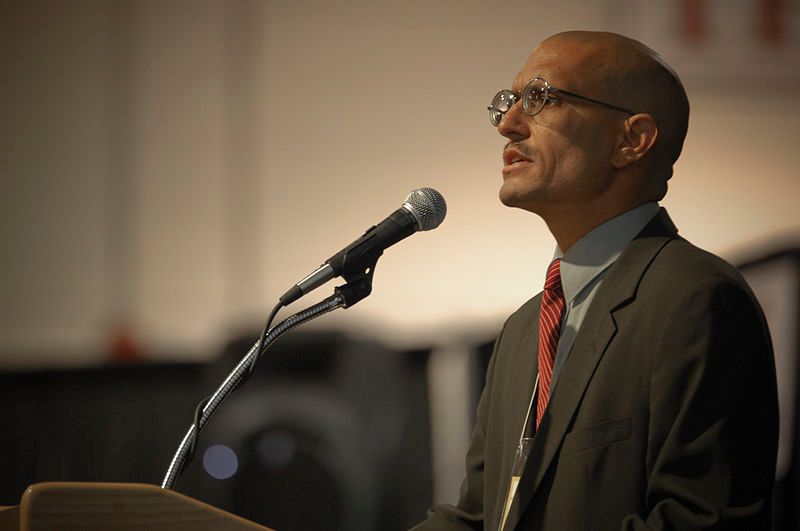
We both respect Andy Bichlbaum (Jacque Servin) of The Yes Men and the work he does to expose and embarrass corporate power. His work has been well-cited in multiple documentaries and we anxiously await his latest project, “The Yes Men Are Revolting.”

But Andy’s smears of us as engaging in “yellow journalism” and partaking in a “conspiracy theory” in our recent investigation on Srdja Popovic and his collaboration with Stratfor read more like the public relations defense of a friend than someone serious about legitimately grappling with the facts on the ground.
What’s worse? An activist collaborating with an intelligence organization labeling Bradley (now Chelsea) Manning a “shit head soldier” who should be fed “to wild dogs” or staunchly defending an activist who collaborated with that organization?
Banality of Evil
When Andy wrote “Stratfor is evil, and Jeremy Hammond went to jail exposing them,” he was correct.
Last month, Jeremy Hammond was given 10 years in jail for hacking into private intelligence firm Stratfor’s computer systems and releasing its emails to Wikileaks. Those emails were then made public and are now called the “Global Intelligence Files.” Hammond’s legal team unsuccessfully tried to get the judge for Hammond’s case to recuse herself due to a conflict of interest when it was revealed that her husband had connections to Stratfor, a fact made public via the “Global Intelligence Files.”
This shows just an inkling of how much power and influence Stratfor wields in elite circles.
Bichlbaum was also correct when he wrote:
“Some of Popovic's choices—from talking to Stratfor in the first place, to working with activists in Venezuela to unseat a democratically-elected leader—can legitimately be called into question.”
We did just that, calling those actions into question and finding some disturbing answers accompanying those questions in the reporting process.
“Doing the Hard Work”
Among the other more serious accusations made of our investigation and reporting on hundreds of Stratfor emails pertaining to Popovic, Bichlbaum accused us of “yellow journalism” instead of “doing the hard work.” In so doing, he juxtaposed our piece with one published by Waging Nonviolence on November 20 that defended Popovic in the wake of the Wikileaks release of the Stratfor emails revealing Popovic's collaboration with the firm. Bichlbaum says that article could serve as a pre-emptive retort to the investigation we released on Monday.
Interestingly, Waging Nonviolence openly admitted in the first section of that article that Popovic is a member of its board of advisors and the information within the article makes it clear that Waging Nonviolence clearly didn’t do “the really hard work” of reading all of the hundreds of emails in which Popovic, CANVAS (Centre for Applied Nonviolent Action and Strategies), and his Stratfor moniker “SR501” were mentioned. Waging Nonviolence also failed to mention that Popovic was so tight with Stratfor he invited several employees to his 2011 wedding in Belgrade, Serbia, and also helped his wife (then his girlfriend) get a part-time job at Stratfor, where she worked for a year.
Srdja and Marija Popovic at their wedding in Belgrade (top), wedding invitation sent to Stratfor employees as an email attachment (bottom)
Unlike Waging Nonviolence, we decided to do the “really hard work” and actually sit and read through all of the emails mentioning Popovic, as well as all of his correspondence with Stratfor analysts, despite the fact Bichlbaum calls the piece “poorly researched.” We question how many of them Bichlbaum read given the lack of substance in his article.
The Waging Nonviolence piece Bichlbaum hails was many things. But it wasn’t journalism. The article read like a reactive PR piece defending a member of a news organization's advisory board, rather than a full investigation into its advisory board member’s exposed relationship not only to Stratfor, but to a Goldman Sachs higher-up and a U.S. government official who now serves as U.S. Ambassador to Russia. Had Waging Nonviolence decided to do journalism rather than crisis communications public relations, it might have been surprised at what it found.
“Crappy Corporate Spy Outfit”?
Bichlbaum belittles Stratfor as a “crappy corporate spy outfit,” a display of his ignorance about the company's rich history of dividing and conquering social movements going back to its days as corporate spy firm Mongoven, Biscoe & Duchin. One “yellow journalist” in this duo, Steve Horn, wrote a two-part historical investigation of Stratfor over the summer.
We strongly encourage Bichlbaum to read those pieces and think twice about calling it a “crappy corporate spy outfit,” given the firm was originally co-founded by one of the original members of the Army DELTA force—the same guys featured in Jeremy Scahill’s book and film, “Dirty Wars.” Horn’s series illustrates how Stratfor divides activists in social movements into several different camps and how those activists could be divided and conquered as part of the work it was paid to do on behalf of its corporate clients.
Collaborating with such an insidious firm is bad enough, but defending that collaborator in spite of all the evidence that’s been made public is irresponsible and potentially hazardous to activists in the long run.
Popovic’s “Innocuous Interactions” with Stratfor
Bichlbaum wrote, “Popovic's interactions with Stratfor seem pretty obviously innocuous on a casual perusal of the Stratfor emails. But the theory that Gibson and Horn prefer to relate, against all evidence, is a much more exciting and perhaps more emotionally satisfying one.”
While painting a broad and dismissive brush—and also admitting he only did a “casual perusal of the Stratfor emails"—Bichlbaum ignored or just chose not to look for evidence that would speak to the contrary about Popovic’s "innocuous" interactions with Stratfor.
A case in point: in one email, Popovic asked several probing questions of an Egyptian activist, forwarded her responses to Stratfor, made a joke to Stratfor about "exploiting" the Egyptian and then received an apology from a Stratfor employee for responding late. Why’d he respond late?
“Sorry I did not get back to you earlier,” the Stratfor employee wrote in the email. “Was trying to help Marmelada with a new piece on the Suleiman strategy for keeping the opposition divided and thus weak.”
The Stratfor employee then asks Popovic a major request after breaking down the power dynamics of the dictatorial regime in Egypt in relation to the activism unfolding in Tahrir Square:
“Oh, btw, would you mind asking your people in Egypt some tactical questions for us?,” the employee wrote to Popovic. “How in the HELL are these protesters in Tahrir maintaining everything, from food to water to sanitation (where do these people shit, Srdja??), all that. We're basically trying to get a feel for how long they could realistically remain in the square, as the army appears to be tiring of the act. If you don't have information on Egypt specifically, maybe you have some anecdotes from past experiences in which protesters were camping in one area and required assistance to keep the thing going.”
Another case in point: Bichlbaum wrote, “At one point Gibson and Horn state that Popovic penned for Stratfor a report on how to unseat Venezuela's Hugo Chavez, even though Popovic told them explicitly that he drafted the report with Venezuelan activists, for activists, with the knowledge from the outset that it would be made public and available for anyone to read, including governments or Stratfor.”
Conveniently left out of Bichlbaum’s smear: Our investigation showed that Stratfor got an advanced preview of that report before it was mass-distributed and placed on CANVAS’s website. Also left out: CANVAS trained anti-Chavez activists in 2007, according to Serbian state media (reported by the same U.S.-funded outlet Popovic’s wife used to work at, in fact), which we cite in our piece but which Bichlbaum left out of his article.
Perhaps “innocuous” to Bichlbaum, others may come to different conclusions upon viewing this and additional evidence.
Popovic’s Right-Wing Money-Man
In our piece, we pointed to Stratfor emails documenting that Popovic introduced Muneer Satter, a Goldman Sachs higher-up at the time, to Stratfor Chairman George Friedman. That section shed light on a close relationship between a self-proclaimed revolutionary activist and a multi-millionaire who donated $300,000 to Karl Rove’s Crossroads GPS Super-PAC in 2012. That Bichlbaum and Waging Nonviolence still take Popovic’s side even after this relationship has been revealed is willfully ignorant.
“Extensive” Emails
In his “How Yellow Journalism Screws The Left” post on the Yes Men website, Bichlbaum mentions emailing Gibson “extensively” about how he and Horn were “barking up the wrong tree” regarding Popovic.
In actuality, the “extensive” nature of those emails were really just one- or two-sentence responses from Bichlbaum immediately dismissing the Wikileaks emails, which Gibson and a Revolution-News.com contributor had sent him during the research phase of the investigation. Bichlbaum closed that exchange with an “extensive” email citing the Waging Nonviolence PR piece defending Popovic, writing, “Excellent article, FYI.”
Bichlbaum also griped that the story didn’t use any quotes from the conversations Gibson had with him while doing research for the story. The reason: in the two 5-minute phone conversations they had, Bichlbaum had to rush off someplace, making the brief conversation and the quotes he gave completely substanceless.
In the second conversation, Gibson couldn’t even hear himself asking questions over the piercing sound of the airport announcing departing flights and boarding procedures. Bichlbaum’s hollow responses made it obvious he hadn’t dedicated any time to reading the emails released by Wikileaks and already had his mind set on defending his friend Popovic, rendering his comments useless in terms of helpful information.
He simply told Gibson to ask Srdja himself and to see what he had to say. And so we did.
Popovic’s Evasion
When Gibson sent Popovic an interview request via email, asking him for a number to reach him for an interview, Popovic agreed but asked to be emailed the questions in advance. Gibson insisted on a phone conversation while Popovic doubled down on email, insisting that he had no time to talk on the phone. When Gibson cold-called Popovic via Skype, he didn’t answer. When Gibson called him from a Google Voice account which he set up with a 512 area code (the same area code used by Stratfor in Austin, Texas), Popovic answered on the first ring. When Gibson told him who he was and that he was hoping to interview him by phone, Popovic hung up.
We ultimately decided to email 10 questions to Popovic and it took him roughly 48 hours to respond. Popovic’s 6-page response was rife with public relations spin and empty platitudes, cherry-picking which parts of which questions to answer in a way that would serve him best. In Gibson’s question to him about getting his wife Marijah a job at Stratfor, Popovic's only answer was that neither he nor his family nor his organization currently collaborated with the firm. Bichlbaum, in his article, was upset we didn’t include a complete transcript of Popovic’s lengthy response in our investigation, but if he read it — which he now can, as we have put it up online — he would see there was very little of value in terms of Popovic's actually addressing the questions we asked. And that’s after Popovic evaded answering numerous phone calls, which should raise red flags for any critical observer.
Ties to U.S. Power Brokers
To his credit, Popovic admitted in his response his close ties with Michael McFaul, U.S. Ambassador to Russia, appointed to the position by President Barack Obama. McFaul previously worked at the right-wing Hoover Institution at Stanford University and served as an International Forum for Democratic Studies Research Council Member for the National Endowment for Democracy. An email posted in the “Global Intelligence Files” demonstrates McFaul played a key role in helping Popovic get funding for CANVAS from the U.S. government.
Given Popovic’s relationships with McFaul; his previous work helping train activists to foment regime change in countries in which Western powers have a vested interest; his questionable relationships with private intelligence firms that are paid by transnational corporations to monitor and gather intelligence on activists, and his close ties to moneyed Wall Street high-rollers, anyone who has read the investigation closely and methodically and still fully trusts Popovic is either incredibly naive or willfully ignorant.
The Company You Keep
Two ex-Stratfor employees Gibson interviewed for the investigation, both of whom only spoke on the condition that they have their names withheld, also defended Popovic in several follow-up emails. Both spoke very warmly of Popovic and lamented that our piece would inevitably ruin his career and reputation with activists he worked with around the world. One source confided to us that Popovic “was like the Martin Luther King of Serbia,” and the other said that we would be tarnishing the name of “one of your own.”
Ironically, Andy Bichlbaum is taking the same position on Srdja Popovic as the same people at Stratfor whom he called idiots. But unlike Bichlbaum, one of the ex-Stratfor sources acknowledged that our reporting was sound after reading the investigation.
We understand the piece was a bucket of ice water in the face of people who have trusted Srdja Popovic for years. We also understand the truth sometimes hurts.
But people like Bichlbaum and those at Waging Nonviolence need to check their bruised egos at the door, acknowledge they made a mistake and continue doing the good work of challenging corporate power while also being mindful of the company they keep. To do otherwise is a disservice to grassroots activists around the world.

Andy Bichlbaum (L) with Carl Gibson (R), Spring 2011
3 WAYS TO SHOW YOUR SUPPORT
- Log in to post comments
















